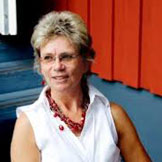
| NYWI HOME PAGE | VISITING WRITERS & EVENTS INDEX | VIDEO ARCHIVES |
 Lo Dagerman Lo DagermanStig Dagerman's daughter |
 Steven Hartman Steven Hartman UAlbany Ph.D. graduate and translator |
NYS Writers Institute, October 25, 2013
7:30 p.m. Reading and Film screening | Page Hall, 135 Western Ave., Downtown Campus
CALENDAR LISTING:
A celebration of major Swedish author Stig Dagerman, who committed suicide in 1954 at the age of 31, will be held on October 25, 2013, at 7:30 p.m. in Page Hall, 135 Western Avenue, on the University at Albany’s downtown campus. The celebration will feature readings and a discussion with Lo Dagerman, his daughter with Swedish movie star Anita Björk, and Steven Hartman, UAlbany Ph.D. graduate and translator of Dagerman’s work into English. Short films based on Dagerman’s stories, directed by the author’s grandson, Dan Levy Dagerman, will also be screened. Free and open to the public, the event is sponsored by the New York State Writers Institute.
PROFILE
At the time of his suicide at the age of 31 in 1954, Swedish author Stig Dagerman was a household name and a literary star. Still in his early twenties, he had become a critically-acclaimed, bestselling author. His work was widely compared with that of Kafka, Faulkner, and Camus. His contemporary, major British author Graham Greene, said, “Dagerman wrote with beautiful objectivity. Instead of emotive phrases, he uses a choice of facts, like bricks, to construct an emotion.”
Dagerman was born on the small family farm of his paternal grandparents in rural Älvkarleby, about 100 miles north of Stockholm. Abandoned by his mother shortly after his birth, Dagerman’s father also eventually left him behind in order to earn a living as a day laborer in Stockholm. It is perhaps not surprising that many of Dagerman’s stories are told from the perspectives of children trying to make sense of the adult world.
In his youth, Dagerman became active in a variety of radical political movements (Anarchism, Syndicalism) and learned the art of writing from his participation in various leftwing journals. Still in his early twenties, he became a critically-acclaimed bestselling author with the publication of two novels, Ormen (The Snake, 1945), and De dömdas ö (The Island of the Doomed, 1946), and a nonfiction account of his travels amid the ruins of post-war Germany, Tysk höst (German Autumn, 1947). Other works published during his explosively productive five year period (1945 to 1949) include the story collection Nattens lekar (The Games of Night, 1947);the novels Bränt barn (A Burnt Child, 1948) and Bröllopsbesvär (Wedding Worries, 1949); and several plays. One of his best known works is the posthumously published collection of prose and poetry, Vårt behov av tröst (Our Need for Consolation is Insatiable, 1955).
In 1954, at the age of 31, after several years of depression and writer’s block, Dagerman committed suicide, leaving behind a young daughter, Lo Dagerman, from a relationship with Swedish film star Anita Björk. Lo Dagerman has been active in conserving and promoting her father’s literary legacy and maintains a website dedicated to his work (www.dagerman.us).
Translator Steven Hartman, UAlbany Ph.D. graduate and former graduate assistant at the Writers Institute, has worked frequently with Lo Dagerman, and has translated and published a number of his stories in American literary magazines since the early 1990s. These translations have been collected in the new volume, Sleet (2013). Hartman, who lives and works in Sweden, is a founding member and chair of the Nordic Network for Interdisciplinary Environmental Studies (NIES) at the Royal Institute of Technology, Division of History of Science, Technology and Environment, in Stockholm, and professor of English at Linnaeus University in Kalmar.
Dagerman’s work is currently being rediscovered by readers and writers on both sides of the Atlantic. Nobel Prize-winning author J.M.G. Le Clezio counts him as an important influence, and paid homage to Dagerman in his Nobel acceptance speech. Other authors who champion his work include Alice McDermott, Mark Kurlansky, Siri Hustvedt, and Edward Schwarzschild. In a preface to Sleet, McDermott says, “An imagination that appeals to an unreasonable degree of sympathy is precisely what makes his fiction so evocative. Evocative not, as one might expect, of despair, or bleakness, or existential angst, but of compassion, fellow-feeling, even love.”
The celebration will also feature two films by Dagerman’s grandson, American filmmaker Dan Levy Dagerman, who has adapted two stories in translation by Steven Hartman: Our Need for Consolation (19 min., 2012), and The Games of Night (20 min., 2008).
For additional information, contact the Writers Institute at 518-442-5620 or online at https://www.albany.edu/writers-inst.